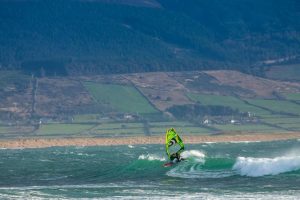
Brandon Bay Surf Forecast and Surf Reports (Kerry, Ireland) available at http://www.surf-forecast.com/breaks/Brandon-Bay_1
Another very good site http://brandon-bay-diary.blogspot.com/p/blog-page_6.html giving all the details of best beaches in which to surf with details of winds, swell and tide and what to expect at each location. Not to be missed.
Jamie Knox Watersports Brandon Bay, Castlegregory, The Dingle Peninsula, Co. Kerry T. 353 66 7139411 E. info@jamieknox.com Web. www.jamieknox.com
Surf Lessons and rentals available year round for adults/kids Summer, kids surf camps during July & August and can work with large or small groups, school tours, birthday parties and stag and hen parties.
So why not make the trip to Castlegregory, Co Kerry, Ireland for some surfing fun.

We can also offer Windsurfing Lessons and rentals, Kitesurfing lessons and Stand up paddle boarding lessons
 Fantastic array of clothing and all things surfing available at his shop
Fantastic array of clothing and all things surfing available at his shop
http://www.kitesurfireland.ie/
https://www.facebook.com/171689849571460/videos/424762508180989/
The 16 Rules of Surfing you should follow, and the DO’s and DON’Ts of surfing:
Priority on a wave
Always make sure that you are not taking anyone else’s wave. Remember that the surfer who is closest to the breaking wave has the priority. If you see someone already on a wave, then the wave is considered to be taken, and you’ll have to wait for the next one.
Hold or Throw your surfboard
It is important to know when to hold on to your surfboard and when to get rid of it. If you are paddling out, then you should keep hold of your surfboard despite the temptation to ‘ditch’ your board and dive under the wave. By keeping your board, you’ll get back to the line up more quickly, and you’ll not put anyone paddling out behind you at risk. If you are about to wipe out, get rid of your board. You are far more likely to sustain an injury if you and your board are getting washed around together.
Stay within your Comfort Zone
You should only ever surf in waves that you are comfortable with. Don’t get in over your head, and remember the phrase “If in doubt, stay out”.
Surf Conditions
Make sure that the surf is safe on your chosen beach before you go in. If you are going surfing at a spot you are unfamiliar with it, is a good idea to get some advice from a local…particularly when you are learning to surf. It is often a good idea to check out the surf spot whilst warming up.
Rips
If you are caught in a rip, remember that there is no need to panic. Surfers use rips everyday to their advantage, and as long as you understand how they work and know how to easily escape on there is no need for concern. Hopefully you already know that a rip is a strong current that (normally) goes straight out to sea. If you find yourself in a rip, you should paddle across the rip (not against it) until you have escaped to where the waves are better breaking.
Patrolled Beaches
If you are surfing on a lifeguard patrolled beach, make sure that you keep within the designated surfing area. Remember, you should never surf between the red and yellow flags. This area is designated for swimmers only. Take note of where you should be surfing before you go out, and make sure you stick to it when you are out.
Sunscreen
Always wear a good waterproof sunscreen like Banana Boat. For those that have been surfing for a while, they are very aware of how much stronger the sun can be in the ocean due to the UV reflection.If you are not wearing a wetsuit, it is a good idea to wear a UV-proof long sleeve rash vest for body protection.
Alcohol
Surfing under the influence of alcohol is not a good idea. Save the drinking for the after-surf session at your local where you can tell everyone just how many barrels you got earlier.
Be Aware
Be aware of other surfers and water users, and of where you are surfing. When you are learning to surf, it is easy to drift into areas which you have not planned for and which may not be suitable for your ability. Keep an eye out for others whilst in the water, and remember to be friendly to everyone!
 Fitness
Fitness
Make sure you are physically fit when surfing. You need to be able to swim back to shore if you lose your board at the end of an exhausting session – no mean feat in a 6ft swell.
Food
As with swimming, do not go surfing for at least 45 minutes after a meal. You can easily get a cramp and this will impact on your ability to surf and stay safe.
Practice
If you want to improve then you need to be in the water surfing as regularly as possible. No one gets better at anything by staying out of the water, or book a surfing lesson at your local Surfing Australia surf school.
Bring a Friend
Always surf with at least one other person. Not only will you have more fun if you are sharing your waves, but you’ll always have someone to help you out if you need it.
Warm-up
Always have a quick warm-up and stretch before entering the surf. This will reduce the risk of muscle injury or cramp while you’re surfing. It also gives you time to check for any rips or where the best spot to learn to surf is.
Respect
Respect the locals if you are visiting a beach. Remember that you are a guest and that waves should be shared.
Fun
Surfing is all about having fun; keep it in mind when you are out in the waves
https://www.learntosurf.com/16-basic-rules-surfing/



